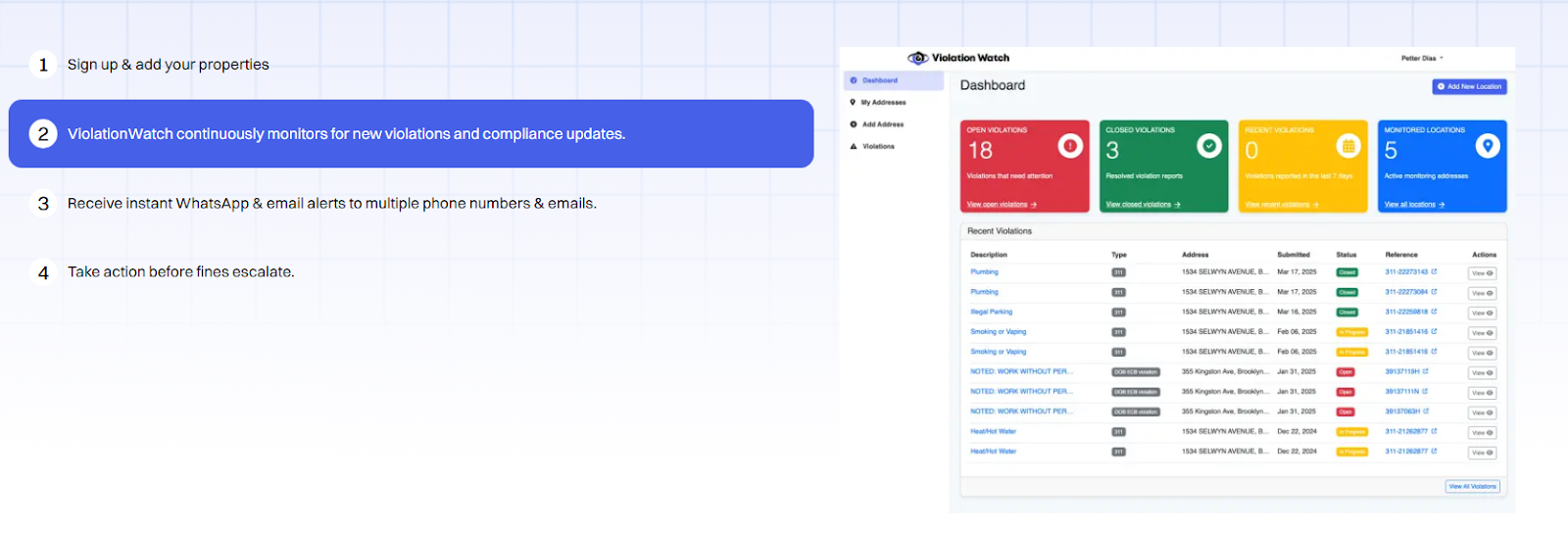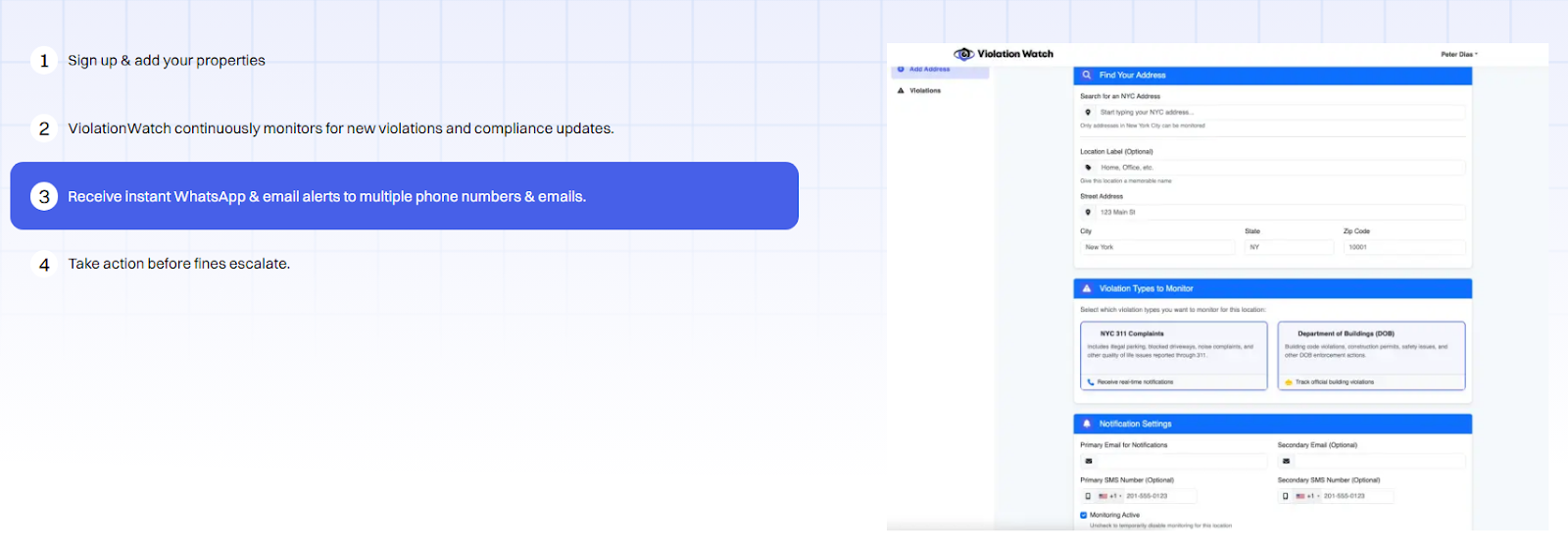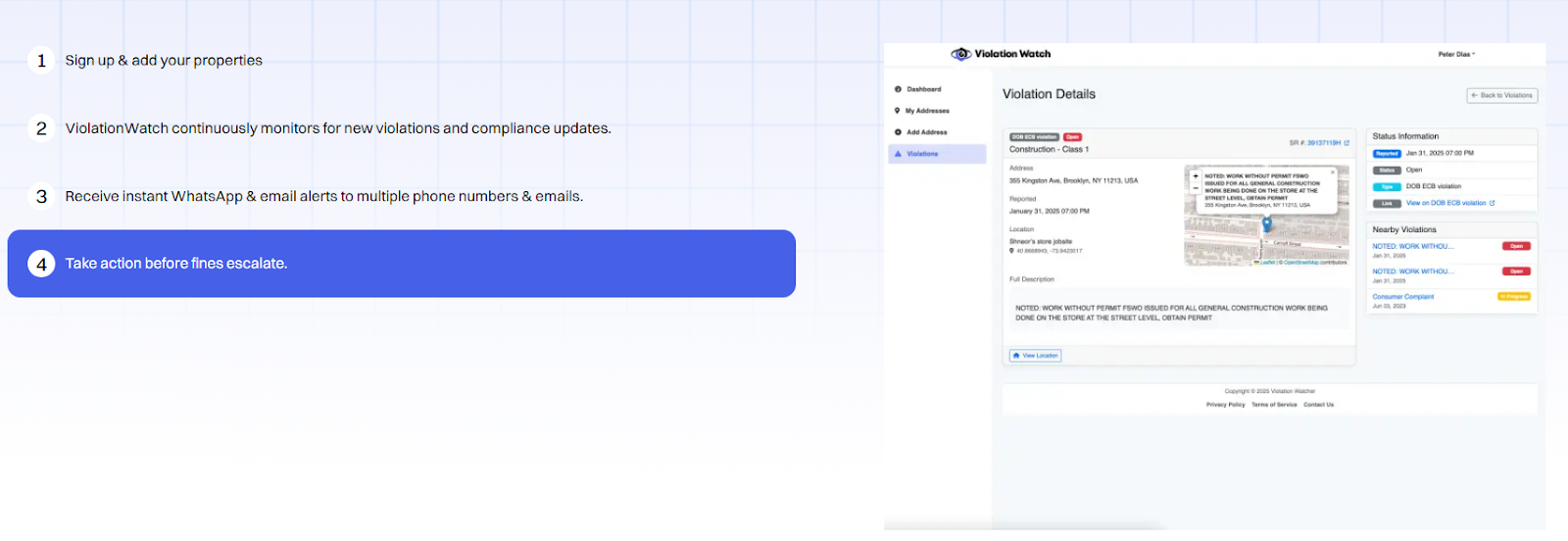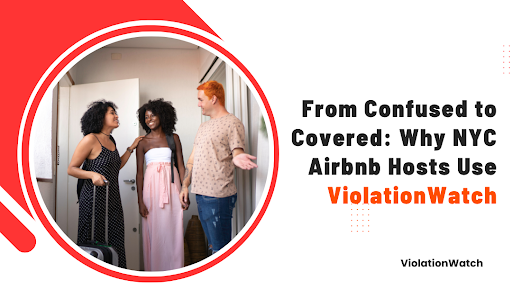You wake up to a $5,000 violation notice slipped under your door. The offense? A fire safety code you didn’t even know existed.
Welcome to the reality of running an Airbnb in NYC, where one missed regulation can cost you months of rental income. The city’s violation system spans multiple agencies, each with its own rules, deadlines, and penalties. Miss a DOB inspection requirement here, overlook an HPD registration there, and suddenly you’re drowning in paperwork and fines.
But what if staying compliant didn’t require a law degree or psychic abilities?
Smart hosts have discovered a way to transform violation chaos into manageable compliance. They’re sleeping better, earning more, and spending less time decoding bureaucratic notices. The difference? They’ve stopped trying to juggle multiple agency websites and started using a system that does the heavy lifting for them.
Here’s what we’ll cover:
- Why NYC’s multi-agency violation system leaves most Airbnb hosts scrambling (and how hosts without proper tracking systems face 3x more violations)
- How automated violation management turns compliance from a full-time job into a 5-minute daily check
- The specific DOB, HPD, and FDNY requirements that trip up 80% of Airbnb operators
- A practical framework for managing violations across multiple properties without losing your sanity
Let’s get started!
The Multi-Agency Maze That Keeps NYC Hosts Up at Night
Picture this. You’re managing three Airbnb properties in Brooklyn. Monday morning, you get a DOB notice about missing carbon monoxide detectors. Tuesday, HPD sends a letter about lead paint disclosure forms. By Wednesday, FDNY wants updated fire safety plans for your building.
Each agency operates in its own universe. Different websites, different deadlines, different penalty structures. What seems like a simple rental business suddenly feels like you’re juggling flaming torches while blindfolded.
The numbers tell a stark story. According to NYC’s Department of Buildings, short-term rental properties received over 12,000 violations in 2023 alone—a 40% jump from the previous year. The average host faces violations from at least three different agencies within their first year of operation.
Why Manual Tracking Falls Apart
Most hosts start with good intentions. They create spreadsheets, set calendar reminders, and bookmark agency websites. But here’s where things unravel.
NYC’s violation ecosystem spans 10 major agencies:
- DOB monitors structural safety and permits
- HPD oversees housing maintenance standards
- FDNY enforces fire safety regulations
- ECB handles environmental compliance
- DEP manages water and sewer requirements
- Each with unique reporting systems and timelines
You check one agency’s website weekly. Another sends paper notices that get buried in mail piles. A third requires in-person visits to their office. Meanwhile, violation notices keep accumulating—many with cure deadlines you’ve already missed.
The Compound Effect of Missed Violations
Here’s what most hosts don’t realize until it’s too late. Violations multiply like rabbits.
Miss one HPD registration deadline? That triggers an inspection. The inspection uncovers three more issues. Each issue generates its own violation notice. Suddenly, one oversight snowballs into a $15,000 problem.
Hosts without systematic tracking face this cascade effect constantly. They’re always playing catch-up, never getting ahead. The stress compounds when you realize that some violations can trigger criminal charges or property liens.
The Hidden Time Tax
Beyond fines, there’s an invisible cost that bleeds hosts dry over time. The average host spends 15-20 hours monthly just monitoring compliance across agencies. That’s half a work week spent refreshing government websites and decoding legal notices.
Consider what that time represents. Hours you could spend improving guest experiences, finding new properties, or actually enjoying the passive income you thought Airbnb would provide. Instead, you’re drowning in bureaucracy.
The manual approach creates a vicious cycle:
- More properties mean more violation exposure
- More violations mean more time firefighting
- More firefighting means less time for prevention
- Fewer prevention guarantees more violations
This explains why hosts without proper systems average three times more violations than those with automated tracking. They’re not worse operators—they’re just overwhelmed by the sheer complexity of NYC’s regulatory landscape.
The Big Three Violations That Blindside Airbnb Hosts

You’d think running an Airbnb would be straightforward. Clean sheets, good WiFi, happy guests. But NYC’s regulatory requirements turn simple hospitality into a compliance minefield.
Three agencies cause the most headaches for short-term rental operators. Understanding their specific requirements—and the sneaky ways they catch hosts off-guard—can save you thousands in fines and countless sleepless nights.
DOB’s Permit Puzzle
The Department of Buildings loves paperwork. Love might be an understatement. They require permits for seemingly minor modifications that most hosts don’t even consider construction work.
Installing a new lock system for self-check-in? That needs a permit. Adding a partition to create a private sleeping area? Permit required. Even mounting a TV on the wall can trigger permit requirements if you’re drilling into certain wall types.
Common DOB violations that catch hosts:
- Operating without a Certificate of Occupancy that matches the current use
- Missing or expired electrical permits for smart home devices
- Unapproved alterations to create additional bedrooms
- Failure to display required notices about building amenities
- Inadequate egress windows in sleeping areas
The kicker? DOB violations often come with stop-work orders. This means you can’t make any changes to fix the problem until you navigate their approval process, which can take months.
HPD’s Registration Nightmare
Housing Preservation and Development operates on a different wavelength. While DOB focuses on physical structures, HPD obsesses over paperwork and tenant rights, even for short-term guests.
Their registration requirements change based on building size, rental duration, and even the neighborhood. Miss one registration window, and you’re automatically flagged for inspection. And HPD inspections are thorough.
HPD requirements that surprise hosts:
- Annual property registration is even for part-time rentals
- Lead paint disclosure forms for buildings built before 1960
- Window guard installations for any guest who might bring children
- Specific temperature requirements during the heating season
- Bedbug disclosure history for the past year
Here’s what makes HPD particularly tricky. They consider Airbnb guests as tenants for certain protections. This means you need to follow residential requirements, not hotel standards. The distinction matters when violation notices start arriving.
FDNY’s Safety Standards
Fire Department requirements might seem obvious—smoke detectors, fire extinguishers, clear exits. But FDNY’s actual requirements go far deeper than basic safety equipment.
They require specific types of detectors in specific locations. Carbon monoxide detectors need to be within 15 feet of sleeping areas, not just somewhere in the apartment. Smoke detectors must be interconnected in larger units. Fire extinguishers need monthly inspection tags.
FDNY violations that cost hosts big:
- Missing or improperly placed carbon monoxide detectors
- Blocked secondary means of egress (yes, that storage in front of the window counts)
- Unapproved space heaters or cooking equipment
- Missing apartment door self-closing devices
- Inadequate fire separation between units
FDNY also conducts surprise inspections based on complaint calls. One unhappy neighbor reporting “suspicious activity” can trigger a full safety audit of your property.
The Overlap Problem
Here’s where things get genuinely complex. These agencies don’t coordinate. You might fix a DOB violation by installing new emergency lighting, only to create an HPD violation because you didn’t file the right tenant notification forms first.
Or you address an FDNY requirement for additional smoke detectors, but the installation method violates the DOB’s electrical permit rules. Each fix potentially creates new problems with other agencies.
This overlap creates multiple pain points:
- Conflicting requirements between agencies
- Different inspection schedules and cure periods
- Varying penalty structures and appeal processes
- No central place to track compliance across all three
The result? Even well-intentioned hosts find themselves in violation of something, somewhere, at any given time. The complexity isn’t accidental—it’s the natural result of multiple bureaucracies operating independently while regulating the same properties.
Why Smart Hosts Choose Automated Violation Management

Running multiple Airbnb properties without a systematic violation tracking system is like driving blindfolded through Manhattan traffic. You might make it a few blocks, but eventually, you’re going to crash.
The hosts who thrive in NYC’s regulatory environment have one thing in common. They’ve stopped trying to be compliance superheroes. Instead, they use tools that turn violation management from a full-time nightmare into a manageable task.
The Sanity Factor
Here’s the brutal truth. You can try to manually track violations across multiple properties. You can bookmark every agency website, create color-coded spreadsheets, and set dozens of calendar reminders. But when you’re managing three, five, or ten properties, that system breaks down fast.
The mental load alone crushes most hosts. You’re constantly wondering: Did I check HPD this week? When was that DOB inspection scheduled? Did I respond to that FDNY notice in time?
ViolationWatch eliminates this mental burden entirely. One dashboard, all your properties, every violation tracked automatically. Your brain can focus on growing your business instead of drowning in compliance anxiety.
The Price of Peace of Mind
Let’s talk money. For just $9.99 per address, you get comprehensive violation monitoring that pays for itself with the first avoided fine. Compare that to:
- Average DOB violation fine: $800-$5,000
- Typical HPD penalty: $250-$1,000 per violation
- FDNY non-compliance fees: Starting at $1,000
One missed violation notice costs more than an entire year of automated monitoring. The math isn’t complicated—prevention beats penalties every time.
But ViolationWatch’s pricing structure goes beyond simple cost savings. Volume discounts make it even more affordable as your portfolio grows. The more properties you manage, the less you pay per unit.
Complete Legal Coverage for Short-Term Rentals
Generic property management tools miss the nuances of Airbnb hosting. They’re built for traditional landlords, not short-term rental operators facing unique compliance challenges.
ViolationWatch covers every agency and regulation that impacts your rental business:
- Short-term rental registration requirements
- Guest safety compliance standards
- Building-specific occupancy limits
- Zoning restrictions for transient use
- Fire safety protocols for temporary residents
You’re not just tracking violations—you’re staying ahead of the specific rules that target Airbnb operations. See exactly who ViolationWatch serves and why short-term rental hosts benefit most.
AI That Actually Works
Most “AI-powered” tools are just fancy calculators with good marketing. ViolationWatch’s engine genuinely learns and adapts to NYC’s constantly changing violation landscape.
The system continuously scans all major NYC agency databases, catching new violations the moment they’re issued. No more discovering month-old notices buried in mailboxes or hidden on obscure government websites.
The AI prioritizes violations by urgency, deadline, and potential penalty amount. You always know which issues need immediate attention and which can wait until tomorrow.
Your Entire Team Stays Informed
Solo hosts struggle enough with violation tracking. Add property managers, maintenance crews, and cleaning staff to the mix, and communication becomes another full-time job.
ViolationWatch’s notification system solves this by alerting everyone who needs to know:
- WhatsApp and email alerts to multiple team members
- Customizable notification preferences by role
- Available in English and Spanish
- Clear action items for each violation type
Your cleaner knows about that missing smoke detector. Your handyman gets the window guard notice. Everyone stays aligned without endless group texts and forwarded emails.
Simplicity That Actually Delivers
You don’t need a computer science degree to use ViolationWatch. The platform follows a dead-simple four-step process:
- Sign up and add your properties

- Let the system monitor for violations automatically

- Receive instant alerts when issues arise

- Take action before fines accumulate

No complex onboarding. No lengthy training sessions. Just straightforward violation management that works from day one.
The Reliability Difference
NYC’s violation tracking landscape is littered with abandoned tools and broken promises. Startups launch with big claims, then disappear when the technical challenges prove too difficult.
ViolationWatch has proven staying power. While competitors struggle with:
- Incomplete agency coverage
- Delayed notifications
- Confusing interfaces
- Hidden fees and surprise charges
ViolationWatch delivers consistent, comprehensive monitoring that hosts actually trust. The platform’s track record speaks for itself through its growing base of multi-property operators who’ve finally found a solution that works.
Beyond Basic Compliance
Smart hosts use ViolationWatch for more than just avoiding fines. The platform becomes your compliance command center, offering:
- Historical violation data for purchase decisions
- Portfolio-wide compliance scoring
- Trend analysis across your properties
- Document storage for inspection records
- Resolution tracking and timelines
You’re not just reacting to violations—you’re building a proactive compliance strategy that protects your investment long-term.
Learn more about how ViolationWatch transforms violation chaos into manageable compliance. The difference between confused and covered comes down to having the right tools for the job.
Stop Playing Violation Roulette—Start Using ViolationWatch
NYC’s violation system doesn’t have to be a mystery. You’ve learned how the multi-agency maze works, what requirements catch hosts off guard, and why manual tracking fails. Here’s what matters:
- DOB, HPD, and FDNY operate independently—missing one agency’s notice triggers cascading fines across all three
- Manual tracking breaks down fast when managing multiple properties—hosts without systems face 3x more violations
- Automated monitoring transforms chaos into clarity—real-time alerts mean you act before problems compound
- Smart hosts invest $9.99 monthly to avoid thousand-dollar surprises
Ready to join hosts who’ve gone from confused to covered? ViolationWatch turns NYC’s violation nightmare into a simple dashboard you actually understand.

